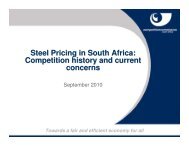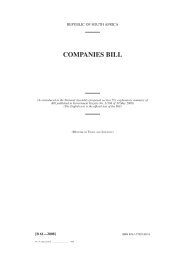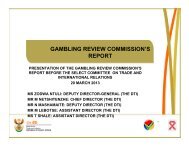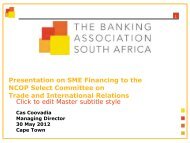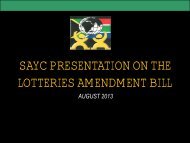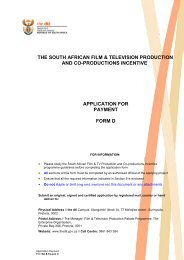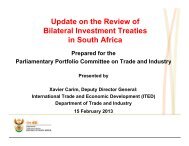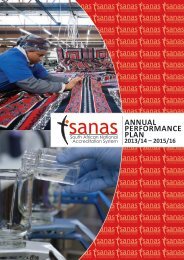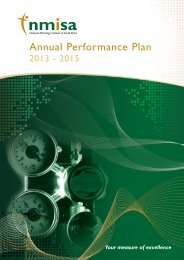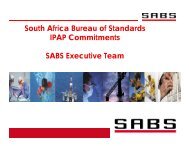Copyright Review Commission Report - ICT Law and Regulation ...
Copyright Review Commission Report - ICT Law and Regulation ...
Copyright Review Commission Report - ICT Law and Regulation ...
- No tags were found...
You also want an ePaper? Increase the reach of your titles
YUMPU automatically turns print PDFs into web optimized ePapers that Google loves.
12.1.3. SAMRO’s differential system of membership is a further indication of an exclusivism that does not fit adevelopmental context. Membership is determined by Board votes rather than objective criteria. Adevelopmental approach to membership of a collecting society may require that the society goes all out torecruit every active creator <strong>and</strong> performer in a country, since copyright would not only be seen as an individualright, but as a national resource empowered by national legislation.12.1.4. Ahmed Abdel Latif (“Global <strong>Copyright</strong> Reform: A View from the South in Response to Lessig”, IntellectualProperty Watch, 22 November, 2010) has argued that WIPO has continuously failed to transform itself into anorganisation that reflects its UN status. He argued that the dismal record of WIPO was due to its history of onlystrengthening copyright rules to the benefit of rights holders <strong>and</strong> at the cost of consumers <strong>and</strong> developingcountries. As far back as 1971, the Berne Appendix was an attempt to make provisions for developingcountries. The WIPO Development Agenda was launched in 2004, aimed at developing <strong>and</strong> promoting a publicpolicy-oriented <strong>and</strong> balanced view of IP in accordance with WIPO’s UN Status. The Declaration, signed by Prof.Lessig <strong>and</strong> many prominent civil society figures <strong>and</strong> academics, invited WIPO to take “a more balanced <strong>and</strong>realistic view of the societal benefits <strong>and</strong> costs of intellectual property rights as a tool, but not the only tool, forsupporting creative intellectual activity”.12.1.5. After three years of discussions, in 2007, 45 recommendations were accepted for the Development Agenda. In2008, under the leadership of a new Director General, WIPO started to show a willingness to address many ofthe issues previously considered taboo. However, the implementation of the WIPO Development Agenda is anon-going process <strong>and</strong> much remains to be translated into tangible <strong>and</strong> concrete changes in WIPO’s activities<strong>and</strong> institutional culture. A Development Agenda Group (DAG) was established as an implementing mechanism.The DAG called for an enduring pro-development cultural transformation within the WIPO Secretariat based onarguments that include: A one-size-fits-all model does not gel with developmental imperatives; War on piracy is denounced as a failure that is criminalising an entire generation; <strong>and</strong> Global reform should not be confined to the digital environment <strong>and</strong> should include limitations <strong>and</strong>exceptions for the visually impaired <strong>and</strong> disabled, educational <strong>and</strong> research institutions <strong>and</strong> libraries.Generally, developing countries view copyright reform through the lens of the broader ‘access to knowledge’framework, which is an important component of the Development Agenda. South Africa is part of the DAG inWIPO <strong>and</strong> serious effort should be made by the government to shift the copyright regime in this country in thedirection of ‘access to knowledge’.12.1.6. Professor <strong>Law</strong>rence Lessig, speaking in Geneva at WIPO in November 2010, called for the creation of a ‘bluesky’ commission, led by WIPO, to consider a new international copyright architecture for the digital age. Centralin fixing the copyright system, he argued, was for WIPO to lead this debate.12.1.7. The WIPO Development Agenda fell outside of the terms of reference of the CRC. However, it may be shortsightedto attempt to correct some of the shortcomings within the copyright regime without acknowledging theSouth African developmental context. Such attempts must include developing the productive base of the musicindustry, strengthening the domestic economy <strong>and</strong> market share, <strong>and</strong> increasing the export of music products.The DAC <strong>and</strong> the dti have embarked on some efforts to grow the music, film <strong>and</strong> cultural industries. However,the focus here may have been more on the macro-, medium <strong>and</strong> small enterprises, with the exclusion of micro-- 87 -




